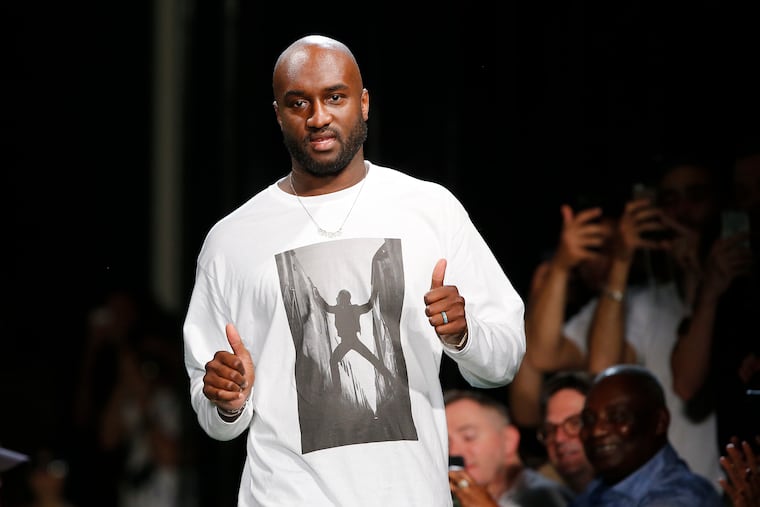Virgil Abloh leaves a legacy that will inspire generations of fashion designers
The creative director of Louis Vuitton men's wear was was among the most powerful Black designers in the industry.

Virgil Abloh gave millennials visibility in the high fashion world.
An avid skater who moonlighted as a deejay, Abloh brought hip-hop to high fashion by marrying it with all things athleisure and shabby chic. His artist’s touch was reminiscent of Andy Warhol. Yet he marketed his vision to a target audience much like the late Karl Lagerfeld.
Abloh, the creative director of Louis Vuitton menswear and founder of the influential streetwear brand, Off-White, died from a rare form of cancer in Chicago on Sunday. He was just 41 years old.
Abloh understood the line, shape, drape, and art of the contemporary wardrobe. His clean lines, natural palette, creased joggers, graphic, and screen-printed hoodies and bubble jackets tapped into the zeitgeist. His clothing was streetwear that took its place in high fashion settings. We wanted to wear his clothes because we felt good in them and we looked good in them. Even during the pandemic, shoppers lined up for city blocks and through the King of Prussia mall to get into the Louis Vuitton boutiques selling the hooded trenches and cargo pants with humongous pockets designed by Abloh.
He was largely responsible for the grungy, Afro-futuristic vibe of Kanye West’s Yeezy clothing and sneaker line after the rapper, now known as Ye, hired Abloh as his creative director in 2010. Abloh had no formal fashion training. In fact, he holds degrees in engineering and architecture. Still, he was a titan of the fashion industry. He’s dressed Serena Williams, Timothée Chalamet, and Drake, among others.
Amanda Gorman wore an off-the-shoulder floor-length confection for the May 2021 cover of Vogue. The dress, with its beautiful Kente-cloth pattern and golden cinched-waist belt, featured a deep slit above the knee. Abloh sparked a flurry of fashion chitchat when he dressed Spike Lee in a hot pink suit for his role as grand jury president of the Cannes Film Festival in May.
Celebrities expressed condolences on Twitter Sunday, as did Bernard Arnault, chairman and chief executive of Louis Vuitton Moët Hennessy, who confirmed Abloh’s death. “We are all shocked after this terrible news,” Arnault said in a statement. “Virgil was not only a genius designer, a visionary, he was also a man with a beautiful soul and great wisdom.” Earlier this year LVMH became the principal shareholder in Abloh’s brand, Off-White.
By the time Abloh entered the high fashion game in the late aughts, creative directors in fashion houses from Fendi to Chanel were well-versed in picking off pieces of hip-hop culture — baggy pants, hoodies, oversize white tees — and repackaging them as their own before sending them down the runways. Black designers who sat at the helm of contemporary menswear lines were hip-hop artists like Jay-Z’s (Roccawear) and Sean “Love” Combs (Sean John).
Abloh was simply a designer. And like Philadelphia’s own Willi Smith — who died at 39 in 1987 — Abloh was inspired by the music and lifestyle of people in his world.
When Ye decided to pursue fashion back in the early aughts, he took an internship at Fendi to build his credibility. There, he met Abloh who was also interning. In 2010, Ye brought Abloh on as the creative director for his emerging fashion line. Abloh helped define Yeezy’s just rolled-out-of-bed aesthetic, where sweatshirts with jagged holes reached new fashion heights.
In 2012, Abloh launched his streetwear line Off-White in Milan. His collections remained filled with leggings, zip-up jackets, and sporty sheaths in basic black, white, and cream, the kind of clothing made to be worn with sneakers. Like those of many high-end designers, Off-White’s runway collection is much more about artistry than wearability. Abloh would add unforgettable pops of color, like in a $375 banana-yellow hoodie.
“He occupied one of those spaces that that Black people in the industry never see ourselves in,” said Kevin Parker, founder and producer of Philadelphia Fashion Week and cochair of the Philadelphia Fashion and Garment Industry Task Force. “It just really hurts. When you walk around Philadelphia and so many people are wearing the Off-White brand, the belts, the accessories, you know he occupied a space in hip-hop culture and fashion like no other. He had so much impact.”
Abloh referred to himself as a maker, and his work expanded beyond fashion. He collaborated with Ikea to make furniture, Nike for sneakers, Evian to make reusable water bottles, and he even designed Big Mac cartons for McDonalds.
A retrospective of Abloh’s work, Figures of Speech, debuted at Chicago’s Museum of Contemporary Art in 2019. The exhibit, a collection of Abloh’s signature clothing, fashion show videos, and furniture designs, just ended a run at the Institute of Contemporary Art in Boston.
Abloh was a first-generation American, born to Ghanian parents in Rockford, Ill., a suburb of Chicago. His mother taught him how to sew. Two years ago, Abloh was diagnosed with cardiac angiosarcoma, a rare form of cancer that causes a tumor to grow in the heart. A statement on Abloh’s Instagram reads: “He chose to endure his battle privately since his diagnosis in 2019, undergoing numerous challenging treatments all while helming several significant institutions that span fashion, art and culture.”
Abloh is survived by his wife, Shannon, his children, Lowe and Gray, and leaves an impressive fashion legacy that will inspire the work of young designers — and hip-hop heads — forever.